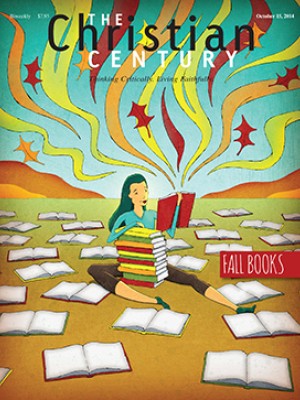Sunday, October 19, 2014: Isaiah 45:1-7; Matthew 22:15-22
It often feels like a rhetorical game, this question of what belongs to God.
In my final year of seminary, Marilynne Robinson came to campus. Officially she was there to visit and speak at the undergraduate college, but she indulged an invitation to an informal seminary gathering as well. Packed into our unsightly refectory, we sat riveted as she spoke about good preaching, the Bible, writing, and Calvinism.
On this last point Robinson openly relished the unspoken challenge posed by a group of Calvin-averse Episcopalians. I don’t remember what specific question a student raised about predestination or total divine providence. Whatever it was, it was obliterated by Robinson’s response: imagine you are faced with grieving parents whose young child has died in a seemingly random and tragic accident. Which is more comforting, to assert that all of this is somehow in God’s hands or to indicate that their child had slipped through some sort of ontological crack?
Read our latest issue or browse back issues.
Robinson’s piercing gaze scanned the silent room, daring us to defend a theology that would leave God occasionally out of control. No one spoke. Checkmate, Calvin.
Of course, I have been similarly moved in the other direction as well—convinced by testimonies of sorrow and searching that found a resting place in a vision of God whose power is small to control but unlimited to redeem. It often feels like a rhetorical game, this question of what belongs to God. How wide is a good God’s providence? Does it include darkness and woe? How deep can the suffering go before we squirm at the idea that this, too, is in God’s hands? And how much do the rise and fall of world leaders in all their awful variety reflect God’s favor and design?
Barbara Brown Taylor’s most recent book, Learning to Walk in the Dark, opens with Isaiah 45:3: “I will give you the treasures of darkness and riches hidden in secret places, so that you may know that it is I, the Lord.” Taylor offers lovely reflections on the value of exploring—rather than running from—loss and unknowing. I’m troubled, however, by the sense of a high security fence around her moon garden of darkness discoveries. It is indeed valuable to uncover “a deeper reverence for the cloud of unknowing, a greater ability to abide in God’s absence, and . . . a fresh baptism in the truth that loss is the way of life.” But it is quite another to search for God’s fingerprints on bloody and lucrative conquests of empire.
Isaiah points to just such fingerprints on the runaway successes of Cyrus, the comparatively benevolent Persian emperor. Crudely put, the promised “treasures of darkness” have more to do with booty than beatific vision. Verse seven ends this selection with a concise statement of God’s providence: “I form light and create darkness, I make weal and create woe; I the Lord do all these things.”
On the heel of so much talk of military triumph and humiliated neighbors, this picture of darkness and woe is very social and very physical. This is no solitary dark night of the soul. What about these shades of darkness that go deeper than unknowing and loss? The violence that pierces human flesh? Acts so dark that the word evil comes to mind, even among middle-class postmodernists?
Americans powerful and common have often interpreted our own victories through a lens of manifest destiny. Russian president Vladimir Putin has been accused of his own brand of manifest destiny as well. After reading all summer about Russia’s relations with the West over embattled Ukraine, the coveted Crimean peninsula, and the downed Malaysian Airlines flight MH-17, I thought of Putin when I read Isaiah 45. How would he read this text? How would it read to his supporters in Ukraine?
This is also a passage about God working through a foreign leader for the benefit of Israel. Perhaps it should raise raw questions about the latest war in Gaza—and about American military aid to Israel, bankrolled by our own past and present treasures.
Into this obfuscated picture of God’s mysterious providence, Jesus’ words in Matthew 22 offer some relief. They do not neatly resolve the matter. They do not divide the world into boxes marked “God’s” and “not God’s.” Yet an ancient interpretive lens reminds me that not everything on this good earth is of equal interest to God. The denarius bears the image of Caesar; thus it belongs to Caesar. Let him have those lifeless coins, Jesus says. But that which bears God’s image—human beings of every tribe and tongue—belongs to God. The value of the coin is diminished; the value of every human life is enriched. In my clinical pastoral education group, an astute colleague noticed that I seem allergic to ascribing any suffering to God’s will. So yes: God is probably not as gentle as I imagine. But I remain convicted that God loves all human beings, and their Spirit-bearing flesh, with passion.
If this week’s readings indicate one thing clearly, it might be this: tread carefully when speaking of God’s domain. Yet we are not left speechless. Jesus’ words order our lives not by marking off segments of the world as outside God’s purview, but by teaching us that everything we do or create—even our very manner of being—is rightly oriented toward God. What belongs to God? In the face of evil and violence, I am not ready to say everything. But each and every human life? Yes, we belong to God, whether we are dirt-poor or powerful dictators. And we are ultimately in the palm of God’s hand.
Yet we have some freedom as to how far we wander from that blessed palm: give to God what is God’s. The divisions may be difficult to discern, but the choice remains.





